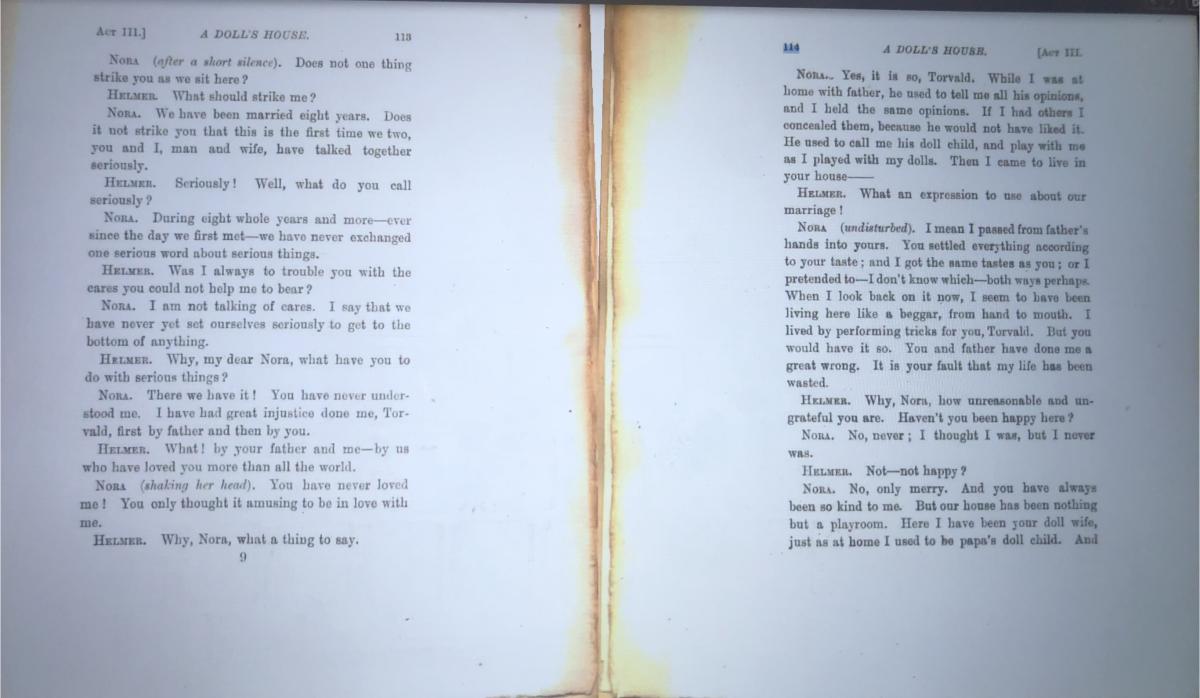New Woman Commentary:
I keep rifling through the parcel to find a page from my favorite play in the entire world: A Doll’s House by Henrik Ibsen. A perfect edition for my scrapbook and seeing the worn pages warms my heart. My mother and I had gone to see it when it was first performed in London in 1889, I can still see the sea of red seats along with the matching curtains. I always rang true with, “You and father have done me a great wrong. It is your fault that my life has been wasted.” (114) It used to terrify me so much so that my life would potentially be wasted away as poor Nora had. Not only so, but to be abused by her husband by financially crippling her and demeaning her after the mistreatment of her father who did the same, I remember reading it the first time and looking at my mother as I asked if the same was to become of me. Of course, she had smiled kindly as we were waiting for the play to start and there was still the rustling of the audience’s voices as she said, “No, of course not my dear.” Even though upon years after years later, I reflected that my mother was Nora and my father Torvald, but I was the helpless watcher on the outside of the pages. Or am I really outside the pages? Afterall, weren’t Nora’s children doomed to the same fate as her, at least her girls? I would hope to laugh in the face of that and use it as the fire in my breast to never see it come into fruition. I will always use this as my inspiration and a remembrance of where I could have been. I’ve made sure to study astrology at my university (one of the only five women I would like to add), work at the library, read every book I can find, and absorb any knowledge I can. I will not waste my life and I think Nora would be proud.
Editorial Commentary:
‘A Doll’s House’ was originally published in 1879 and was first performed in 1889 within London (Christian), a good amount of time after the emphasis on women’s rights and the rise of the “New Woman”, which explains the evolutionary arc of the main character, Nora, who breaks away from her toxic husband, Torvald, in order to be treated equal and pursue her own desires. The woman of the commonplace book loves such a play as that was what every New Woman of the Victorian era was dreaming of: breaking the constraints of men and pursuing their own desires and careers. New Women were considered progressive and looking for equality between the sexes. Considering everything of which the woman has done, such as attending a university and having a job, it is understandable why such a play would be an inspiration for her. The play reflects both the people in her life and the many lives of other women in Victorian society. Victorian society had people like Torvald and the woman’s father, who are oppressing women under their control and the patriarchy, yet on the opposite there are women like her who break free of these constraints (Jabeen). ‘A Doll’s House’ would be an accurate depiction of the actual societal strife within Victorian society and the “New Woman” vs “Old Woman” debate as there was a range of people who agreed with women’s right but there was a spectrum. A Doll’s House would represent the two most extreme opposites of that spectrum.
Christian, Mary. “‘A Doll's House Conquered Europe’: Ibsen, His English Parodists, and the Debate over World Drama.” MDPI, Multidisciplinary Digital Publishing Institute, 22 Apr. 2019, www.mdpi.com/2076-0787/8/2/82.
Ibsen, Henrik, and Nicholas Rudall. A Doll's House. I. R. Dee, 1999.
Jabeen N. “Power and Inequality”: A Study of Ibsen’s A Doll’s House. Kashmir Journal of Language Research. 2020;23(1):233-243. Accessed April 12, 2021. https://search.ebscohost.com/login.aspx?direct=true&AuthType=ip,shib&db…


